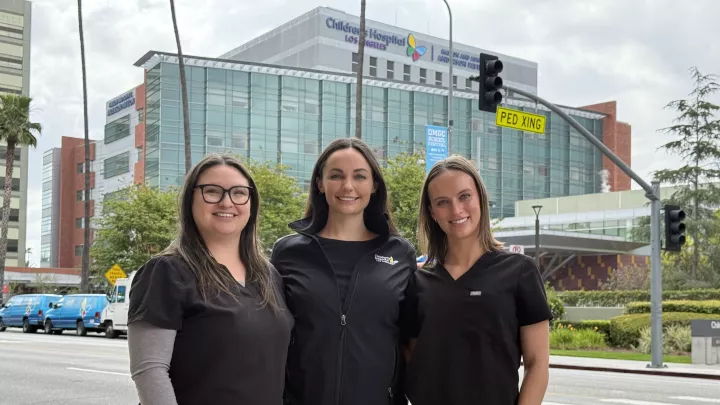About Giving Blood
The immense support we receive from donors like you helps us meet 90 percent of our patients' needs for blood transfusions each year at Children's Hospital Los Angeles. Giving blood is safe, and we do everything we can to make it easy and comfortable for you when you give this most precious gift to the children in our care.
Blood Donor Qualifications
Below are the following blood donation qualifications based on the U.S. Food and Drug Administration (FDA) and Association for the Advancement of Blood and Biotherapies (AABB) guidelines and regulations:
- 17 years of age or older
- 110 pounds or heavier
- Able to provide a picture ID (Driver’s License or Passport, preferred)
- Able to meet the criteria for recent travelers
Read the Blood Donation Qualification fact sheet and medication deferral list for more information.
Changes in Blood Donor Eligibility Rules, including Individual Donor Assessment, are NOW in Effect
Effective December 4, 2023, CHLA can accept some individuals as blood donors who were previously deferred by the FDA guidelines for European travel and/or sexual orientation.
CHLA is live with the FDA approved Individual Donor Assessment, a new inclusive screening process to expand donor eligibility. The changes include an evidence-based approach to individual donor assessment for all blood donors – regardless of sexual orientation and gender identity – to reduce the risk of transfusion-transmitted HIV.
The FDA announced the revised guidelines in May 2023, but CHLA required time to modify computer systems, update procedures, and train staff in order to implement these changes safely. Thank you for your patience.
Old guidance: Gay and bisexual men were required to wait three months following their last sexual contact with another man.
New guidance: All potential donors are now screened using questions to assess individual risk of HIV, regardless of gender or sexual orientation.
Changes to the questionnaire and eligibility:
- All prospective donors will be asked:
- If they are currently pregnant, and if they have EVER been pregnant.
- If they have had new or multiple sexual partners in the past 3 months
- A prospective donor who reports having new or multiple sexual partners in the past 3 months would then be asked about a history of anal sex in the past 3 months to evaluate the risk for a newly acquired HIV infection
- Addition of deferrals for donors taking medications to prevent HIV infection such as pre-exposure prophylaxis (PrEP) or post-exposure prophylaxis (PEP)
- An individual taking oral would be deferred for 3 months from their most recent dose.
- An individual who has received any medication by injection to prevent HIV infection would be deferred for two years from their most recent injection.
- In people taking PrEP, low levels of HIV may be missed by current testing methods. There needs to be more research on how PrEP and PEP affect HIV testing.
- An individual who has EVER taken any medication to treat HIV infection is permanently deferred.
- Deferral period reduced to 3 months (previously 1 year) for individuals who have had sexual contact or live with a person who has certain types of hepatitis.
No deferral (eligible to donate) for individuals with a prior risk of vCJD (“mad cow” disease):
- Those who have spent a total of 5 years or more in France and Ireland cumulatively in the period from 1980-2001
- Those who have spent a total of 3 months or more in the United Kingdom in the period from 1980-1996
- Those who have received a blood transfusion in the United Kingdom, France, or Ireland from 1980 to the present
A safe and reliable blood supply for patients in need of lifesaving blood transfusions is of the utmost importance. Please reach out to CHLA Blood Donor Center for any questions.
Before You Donate
Instructions for ALL Blood and Platelet Donors
- The day before donation drink extra fluids
- Eat a healthy meal at least four hours before donating
- Do not fast
- Bring ID with you (must have valid picture I.D.). ID cannot be expired. Driver’s License and passport preferred.
- You should not be under the influence of alcohol or recreational drugs at the time of donation
Instructions for Platelet Donors
Individuals should not take any ibuprofen, aspirin or non-steroidal anti-inflammatory medication 48 hours prior to donating.
Donors who have EVER been pregnant need to be screened in advance. Call 323-361-2441 for more information.
Do you need translation services?
To protect your confidentiality, family and/or friends cannot serve as interpreters during the screening process. Please let us know in advance if you require translating services, we will be more than happy to make arrangements for you (call or email).
During Your Donation
The entire process of a blood donation takes about 45 minutes.
- Verify Your Eligibility
You will answer a questionnaire with about 40 yes or no questions. A healthcare professional will then review your health history questionnaire on the day of donation. Some of the information discussed will be personal, including sexual behaviors. - Check Your Vital Signs
One of our staff members will check your blood pressure, pulse, temperature, and take a blood sample for anemia. - Begin Your Donation Process
The actual collection for a whole blood donation takes around 15 minutes. Your body starts replenishing blood almost immediately. Blood can be donated every 8 weeks. - Ready for Departure
We will provide you with snacks, juice, and validation for your parking.
After You Donate
- Remember to drink plenty of fluids
- Leave your bandage on for at least 4 hours
- Do not smoke for at least one hour
- Do not skip a meal
- Do not perform any strenuous activities
- Make an appointment for your next donation
What if I Can't Donate?
Don't let the blood donation rules discourage you from supporting care for our patients. You can still help our patients in numerous ways:
- Organize a Blood Drive
By encouraging others to donate, and by organizing a blood drive, you can contribute far more than a pint of blood every eight weeks. - Distribute Information
You can also distribute information about the importance of blood donations for sick and injured children at school, work, and to your church or synagogue. Email us or call 323-361-2441 to receive materials and ideas about how to encourage your friends and relatives to donate blood for our patients. - Volunteer
You may choose to donate your time by volunteering at our hospital. - Make a Monetary Gift
A monetary gift or pledge can make a significant difference in our ability to provide the highest quality care for children who are seriously ill or injured.


